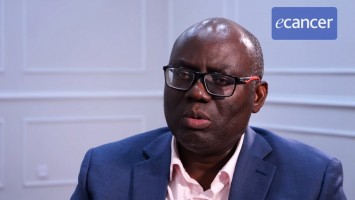The World Cancer Congress gave me the opportunity to highlight many areas that the WHO Eastern Mediterranean Region Office is working on. First of all, we’re looking at cervical cancer elimination and that was the focus of one of my talks. We have a regional strategy that we developed that is very much aligned to WHO’s global strategy for cervical cancer elimination but that has been contextualised to meet the needs of the region. So we know the challenges of committing to cervical cancer elimination because the region has so many emergencies, so many other competing health priorities, but we hope with the strategy that we’ve developed to address some of the key constraints that would limit the uptake of this strategy such as the health system strengthening issues as well as the issues around communication, advocacy, stigma. So these are very well highlighted. This is, of course, in addition to the key strategies that the cervical cancer elimination focus is on. So the three pillars – vaccination, screening and treatment. So that is very much addressed in our strategy, how do we do it and how do we convince our policy makers to take up the strategy.
Are there any success stories from this region that could serve as a model to others?
Some of the successes are that since the launch of the strategy we’ve seen a lot more dialogue around cervical cancer elimination. It’s been highlighted in many different fora; we still don’t have any resolution or anything on it. But the fact that we launched the strategy as part of our regional committee two years ago was also a chance to give the information to many policy makers.
We have now a number of countries in the region that have started vaccinating girls and that is also a very plus that will encourage other countries in the region to also go in the same direction. We’re also providing technical assistance to different countries so that they do more screening that is aligned with WHO recommendations as much as possible. We’re working a lot on palliative care for women with cancer as well as for all other cancers and other chronic diseases. So these are some of the areas that we are focussing on and we really hope that with the strategy we will gain momentum.
I can also speak to another perspective that we are adding which is doing an economic investment case on women’s cancers. Because we know the sort of information that policy makers need, they really need to know what is the return on investing in cervical cancer. We’re trying to generate that data for the region; we now have it at regional level and it is really showing our policy makers the cost of inaction. It’s telling them if you do not invest in cervical cancer it will be a huge cost on the economy. It will be huge numbers of deaths and morbidities by the year 2040. So this is the sort of data we’re generating and we are using that to support the advocacy that we do.
Are there any existing plans to implement gender-neutral HPV vaccination programs?
Yes, WHO already has guidelines that support this and we are very much aligned to that. Currently the countries that have started implementing HPV vaccination, although a small number in the region, they are still going with the two-dose vaccine. We are now trying to push the new WHO recommendation for the one dose because that makes sure you reach a wider range, you can reach women in hard to reach areas with the one dose and you are done with having them vaccinated. So, yes, that’s also a very great opportunity.
In the region also we have countries that are supported by GAVI so we are trying to encourage those countries to take the opportunity, grab the opportunity, that GAVI is giving you. Start vaccinating your girls and make some change in women’s health in the region.
Is there anything else you would like to add?
I’d like to speak a bit to the issue of engaging with people living with cancer. That’s also a very important aspect for our region because the health infrastructure is very much compromised in our region. There’s not enough attention and the voices of people living with cancer can actually support the efforts that we are doing to ensure that cancer gets prioritised.
So we now have a project, we’re actually targeting six countries and we hope that will be a start where we can actually amplify the voices of people living with cancer, make sure that they are really involved in decisions that affect their lives. We want it to be real involvement. We are not talking statistics, they have to be part of the process where policies are made that affect them.








